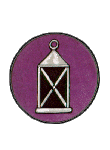
Order
of
Service

 |
Order |
 |
This is an example of a Save K'Noran temple common ritual (Velere), one which all adherents to the religion are expected to attend each Holy Day. The prayers and psalms etc. given are examples, and the overall order of service is by no means universal, although the basic form of [gather, join communal chant, address faithful, purify/purge unbelievers, worship and sermons (including treatises with "religio-politically correct" messages), blessing] holds in the vast majority of cases. Announcements of community activities is usually done either before or immediately after the blessing. The Velere service most commonly takes place at or shortly after dusk on the sixth of each month.
Come thee, thou thoughtful scholars!
Come thee, thou lucid taleweavers!
Come thee, thou careful judges!
Come, all thee with wit who will follow the Lost Guide,
Come into the house of thine ultimate Judge and Critic
And here find comfort for thy musings.
For what boots our six senses without Knowledge?
And what boots Knowledge, lest we find Meaning?
And what boots Meaning, without that we Judge its Worth?
Come! For here you may find Knowledge,
And within Knowledge, you may find Meaning,
And within Meaning, you may find the Wisdom to Judge Worth.
People of the Sage of Heaven,
we are here to praise the Lord of Conundrums and share His gifts.
If you see one here present who is not fit to offer
praise or to receive Knowledge, speak forth!
I venerate thee, O Judge of Judges,
I praise thee, Great Keeper of Lore!
For in thy going out and thy coming in
Art thou regal above all Kings and Princes.
bow to thee, Source of all Puzzles,
I adore thee, Knower of all Ways.
For my foot is bruised if I lack thy illumination,
My path a knotted fleece if I lack Thy guidance.
I kneel before thee, O Teacher of all Lessons,
I worship thee, O Most Holy Sage.
For I am thine,
And I strive to be worthy of thee.
It is written that there lived once a man, and he had a goodly nieghbour. This neighbour was a knight, and a man of honour and careful thought, but he was not learned, as was the first man. And so the neighbour asked the first man to take what he told to him of his family history, and to set it down aright, that his family would know who they were, and whence they came, until the end of days. So the first man took what the neighbour told him of his family history and he set it down as he was told it.
Now it came to pass that the man fell upon straitened times, and he besought him means for his family. He learned then of a Baron, a mean and jealous man, against whom his neighbour had fought many years before. So he went to his neighbour and said "Lo, I am in need of means, and you have such in plentitude! I beg thee of thy generosity to give me aid". But his neighbour saith "Oh, but I have not plenty! I pity your distress, o my neighbour, but mine own family needs must come before thine in my sight". So the man said "Ah, but that you do not help me, I needs must sell mine only unsold work, being the history to thy family; there is a rich man and a Baron who I know would pay hansomely therefore". And the neighbours brow was clouded, and the world darkened in his sight, for he knew what the Baron would do if he knew that it had been he who fought against him so long ago. So the neighbour gave the man means, but his heart was forever turned against him. Shortly thereafter it came to pass that the people of the town where these men lived was sore beset with poverty and plague, and the people were restless. Then the neighbour, red with his hatred for the harm done to his family, did raise the people up, saying "Lo, it is the people of learning who have let us down! They have looked after their own weal instead of teaching us how we may prosper!". And the people rose up, and they did riotously tear down the houses of the learned, and the man was slain, and his family for three generations.
[Lessons to be drawn from this are that knowledge, though it is all sacred, can also be dangerous and that, in order to safely hold dangerous knowledge one needs not only wisdom and restraint, but also the means to withstand adversity]
We believe in the supremacy of the intellect,
We worship the Sage of Heaven, and bow down to him.
All knowledge is sacred, each shred to be cherished,
Each thought to be valued above life* or physical wealth.
We live for the mysteries unveiled, we search for the light unseen,
We strive to become worthy of service in Inor Teth.
May the Sage Most High bring you tranquillity in your thoughts and
clarity of vision,
May you drink deep of the cool waters of knowledge.
May the countenance of the High Riddler be not turned from you,
And may the Light Unseen shine for you.
Go thee in peace, and may the razor of thy mind be never dulled.
Original author was Mark Hazen,
but has been edited by Avathar Valcana
for campaign reasons.